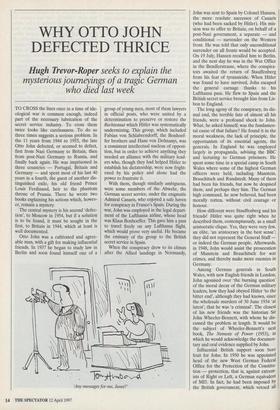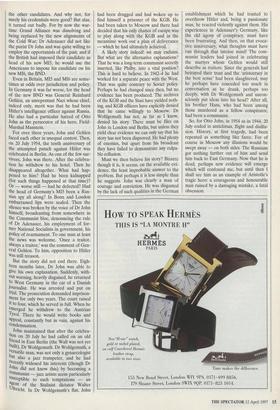WHY OTTO JOHN DEFECTED THRICE
Hugh Trevor-Roper seeks to explain the
mysterious joumeyings of a tragic German who died last week
TO CROSS the lines once in a time of ide- ological war is common enough, indeed part of the necessary lubrication of the secret service industry. To cross them twice looks like carelessness. To do so three times suggests a serious problem. In the 11 years from 1944 to 1955, the late Otto John defected, or seemed to defect, first from Nazi Germany to Britain, then from post-Nazi Germany to Russia, and finally back again. He was imprisoned in three countries — Portugal, Britain and Germany — and spent most of his last 40 years in a fourth, the guest of another dis- tinguished exile, his old friend Prince Louis Ferdinand, heir to the phantom throne of Prussia. There he wrote two books explaining his actions which, howev- er, remain a mystery.
The central mystery is his second 'defec- tion', to Moscow in 1954, but if a solution is to be found, it must be sought in the first, to Britain in 1944, which at least is well documented.
Otto John was a cultivated and agree- able man, with a gift for making influential friends. In 1937 he began to study law in Berlin and soon found himself one of a group of young men, most of them lawyers in official posts, who were united by a determination to preserve or restore the Rechtsstaat which Hitler was systematically undermining. This group, which included Fabian von Schlabrendorff, the Bonhoef- fer brothers and Hans von Dohnanyi, was a consistent intellectual nucleus of opposi- tion, but in order to achieve anything they needed an alliance with the military lead- ers who, though they had helped Hitler to establish his dictatorship, were now fright- ened by his policy and alone had the power to frustrate it.
With them, though similarly ambiguous, were some members of the Abwehr, the German secret service, under the enigmatic Admiral Canaris, who enjoyed a safe haven for conspiracy in Franco's Spain. During the war, John was employed in the legal depart- ment of the Lufthansa airline, whose head was Klaus Bonhoeffer. This gave him a pass to travel freely on any Lufthansa flight, which would prove very useful. He became the emissary of the group to the British secret service in Spain.
When the conspiracy drew to its climax after the Allied landings in Normandy, 'Any messages for me, Janet?' John was sent to Spain by Colonel Hansen, the more resolute successor of Canaris (who had been sacked by Hitler). His mis- sion was to offer to Britain, on behalf of a post-Nazi government, a separate — and conditional — surrender on the Western front. He was told that only unconditional surrender on all fronts would be accepted. On 19 July, Hansen recalled him to Berlin, and the next day he was in the War Office in the Bendlerstrasse, where the conspira- tors awaited the return of Stauffenberg from his feat of tyrannicide. When Hitler was found to have survived, John escaped the general carnage thanks to his Lufthansa pass. He flew to Spain and the British secret service brought him from Lis- bon to England.
The long agony of the conspiracy, its dis- mal end, the terrible fate of almost all his friends, were a profound shock to John. What, he asked himself, was the fundamen- tal cause of that failure? He found it in the moral weakness, the lack of principle, the opportunism of its essential agents, the generals. In England he was employed largely in propaganda, advising the BBC and lecturing to German prisoners. He spent some time in a special camp in South Wales where some of the highest German officers were held, including Manstein, Brauchitsch and Rundstedt. Many of them had been his friends, but now he despised them, and perhaps they him. The German high command, he now believed, had been morally rotten, without civil courage or honour.
How different were Stauffenberg and his friends! Hitler was quite right when he described them, contemptuously, as a small aristocratic clique. Yes, they were very few, an elite, 'an aristocracy in the best sense'; they did not represent the General Staff — or indeed the German people. Afterwards, in 1948, John would assist the prosecution of Manstein and Brauchitsch for war crimes, and thereby make more enemies in Germany.
Among German generals in South Wales, with new English friends in London, John agonised over 'the burning question' of the moral decay of the German military leaders, how they had obeyed Hitler 'to the bitter end', although they had known, since the wholesale murders of 30 June 1934 'at latest', that he was 'a criminal'. The closest of his new friends was the historian Sir John Wheeler-Bennett, with whom he dis- cussed the problem at length. It would be the subject of Wheeler-Bennett's next book, The Nemesis of Power (1953), in which he would acknowledge the documen- tary and oral evidence supplied by John.
Influential British support soon bore fruit for John. In 1950 he was appointed head of the new West German Federal Office for the Protection of the Constitu- tion — protection, that is, against extrem- ists of Right or Left, a German equivalent of MI5. In fact, he had been imposed by the British government, which vetoed all the other candidates. And why not, for surely his credentials were good? But alas, it turned out badly. For by now the war- time Grand Alliance was dissolving and being replaced by the new alignments of the Cold War; Dr Adenauer did not like the purist Dr John and was quite willing to employ the opportunists of the past; and if the British had imposed their candidate as head of his new MI5, he would use the Americans to impose his candidate on his new MI6, the BND.
Even in Britain, MI5 and MI6 are some- times at odds over jurisdiction and policy. In Germany it was far worse, for the head of the new BND was General Reinhard Gehlen, an unrepentant Nazi whose chief, indeed only, merit was that he had been Hitler's intelligence officer against Russia. He also had a particular hatred of Otto John as the persecutor of his hero, Field- Marshal Manstein.
For over three years, John and Gehlen faced each other in unequal contest. Then, on 20 July 1954, the tenth anniversary of the attempted putsch against Hitler was celebrated in Berlin. As one of the few sur- vivors, John was there. After the celebra- tion he withdrew to his hotel. Then he disappeared altogether. What had hap- pened to him? Had he been kidnapped (for such things happened at that time)? Or — worse still — had he defected? Had the head of Germany's MIS been a Rus- sian spy all along? In Bonn and London embarrassed lips were sealed. Then the Silence was broken by the voice of Dr John himself, broadcasting from somewhere in the Communist bloc, denouncing the rule Of Dr Adenauer, his employment of for- mer National Socialists in government, his Policy of rearmament. To one man at least the news was welcome. 'Once a traitor, always a traitor,' was the comment of Gen- eral Gehlen. To him, opposition to Hitler was still treason.
But the story did not end there. Eigh- teen months later, Dr John was able to give his own explanation. Suddenly, with- out warning, heavily disguised, he returned to West Germany in the car of a Danish Journalist. He was arrested and put on trial. The prosecution demanded imprison- ment for only two years. The court raised it to four, which he served in full. When he emerged he withdrew to the Austrian Tyrol. There he would write books and appeal, constantly but in vain, against his condemnation.
John maintained that after the celebra- tion on 20 July he had called on an old mend in East Berlin (the Wall was not yet built), Dr Wohlgemuth. Dr Wohlgemuth, a versatile man, was not only a gynaecologist but also a jazz trumpeter, and he had recently widened his interests (though Dr John did not know this) by becoming a communist — jazz artists seem particularly susceptible to such temptations — an agent of the Stalinist dictator Walter Ulbricht. In Dr Wohlgemuth's flat, John had been drugged and had woken up to find himself a prisoner of the KGB. He had been taken to Moscow and there had decided that his only chance of escape was to play along with the KGB and in the meantime work out a plan of deliverance — which he had ultimately achieved.
A likely story indeed! we may exclaim. But what are the alternative explanations? That he was a long-term communist secretly inserted, like Philby, into a vital position? This is hard to believe. In 1942-4 he had worked for a separate peace with the West. That was quite contrary to Soviet policy. Perhaps he had changed since then, but no evidence has been produced. The archives of the KGB and the Stasi have yielded noth- ing, and KGB officers have explicitly denied that he came willingly to Moscow. Dr Wohlgemuth has not, as far as I know, denied his story. There must be files on John in London and Berlin, but unless they yield clear evidence we can only say that his story has not been disproved. He had plenty of enemies, but apart from his broadcast they have failed to demonstrate any culpa- ble collusion.
Must we then believe his story? Bizarre though it is, it seems, on the available evi- dence, the least improbable answer to the problem. But perhaps it is less simple than he suggests. John was clearly a man of courage and conviction. He was disgusted by the lack of such qualities in the German establishment which he had trusted to overthrow Hitler and, being a passionate man, he reacted violently against them. His experiences in Adenauer's Germany, like the old agony of conspiracy, must have been frustrating. And then, on that evoca- tive anniversary, what thoughts must have run through that intense mind! The com- munist leaders had joined in celebrating the martyrs whom Gehlen would still describe as traitors. Since the generals had betrayed their trust and the 'aristocracy in the best sense' had been slaughtered, may he perhaps have conceded too much in conversation as he drank, perhaps too deeply, with Dr Wohlgemuth and uncon- sciously put ideas into his head? After all, his brother Hans, who had been among those murdered as a fellow conspirator, had been a communist.
So, for Otto John, in 1954 as in 1944, 20 July ended in anticlimax, flight and disillu- sion. History, at first tragedy, had been repeated as something like farce. For of course in Moscow any illusions would be swept away — on both sides. The Russians got nothing further out of him and send him back to East Germany. Now that he is dead, perhaps new evidence will emerge which will confound me, but until then I shall see him as an example of Aristotle's tragic hero: a courageous and honourable man ruined by a damaging mistake, a fatal obsession.



































































 Previous page
Previous page